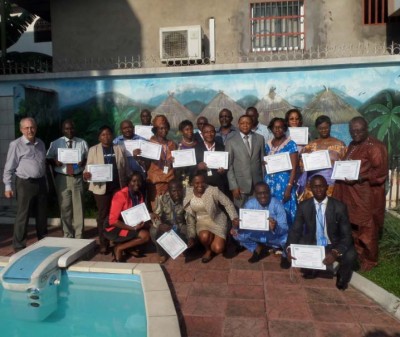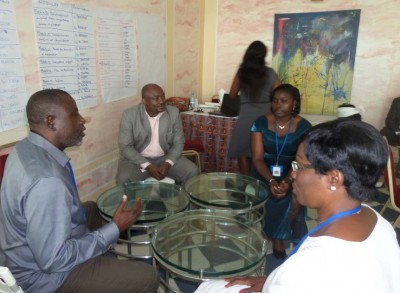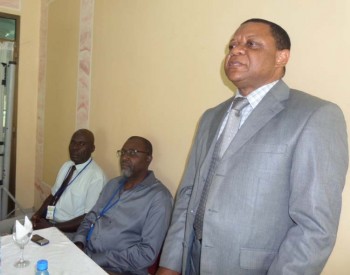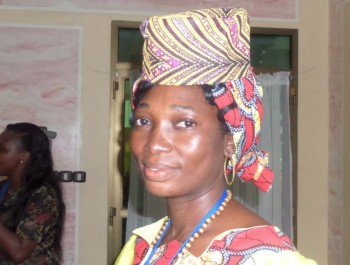Hereby the report (Rapport du cours PBF Douala V261114) of the 41st PBF course in Douala. SINA Health in collaboration with the Regional Fund of Littoral finished this course at the 7th of November. There were 17 participants: 10 from Cameroon, 5 from the Central African Republic, 1 from Burundi and 1 from Congo Brazzaville. All 17 participants passed the final test and 5 obtained distinctions.
It was a very pleasant and dynamic group in Douala and this PBF course became special due to its focus on a miscellaneous number of topics such as notably PBF in education (CAR), PBF in administration e.g. police and local tribunals (Burundi), Ebola prevention as well as on PBF in emergency situations in the Central African Republic and East Cameroon. It shows how varied PBF has become and how fast PBF expanded during 2014.
The atmosphere during the course was that of hope whereby PBF has the potential to provide instruments to advance good governance, to directly inject money in communities and social services, to better manage health facilities, schools and administrative structures and to stimulate the local economy.
There is still a lot of work. PBF instruments must be further developed and tested in each specific situation and country and we need more people to do this work. The outstanding issues are notably how to select the vulnerable at low cost; how to strengthen community PBF; the development of the standard quality and business plan tools in the education and the administration sectors.
We congratulate the authorities in Cameroon and the Central African Republic with the fact that PBF seems in their countries to be the future reform approach. Cameroon will expand during 2015 the number of PBF regions from 4 to 7 and in CAR it seems PBF is the preferred way forward in the health and education sectors.
Moreover, it is also encouraging that the Burundi PBF experience since 2005 has now finally produced three scientific papers in respectively Social Science & Medicine, Health Affairs and the Global Journal of Health Science. This confirms what all those active in Burundi since 2005 already knew, which is that PBF produced very visible positive results. Yet, this was somehow difficult to “prove” scientifically. The three papers all show that the PBF approach produced encouraging results in Burundi and in particular by improving the quality of care. Yet, the papers also recommend more action research on specific topics such as targeting the vulnerable and thereby to further perfect the PBF system.
We would also like to congratulate the government of the Republic of Congo (Brazzaville), which has now started to release the funds to expand PBF to 86% of the population.
One of the nice thing about the PBF courses is also that friendships develop and we hope that those contacts will continue to deepen among the PBF family members who attended the PBF courses since 2007 and among those who are members of the Community of Practice PBF.
In these times of conflicts, displacements, the Ebola epidemic and overburdened social services in schools and the judiciary system PBF provides a bright spark of hope and we must work hard that also in 2015 PBF will further advance and improve. SINA Health is committed to that aim and will assist organisations, countries and individuals to advance this performance agenda.






